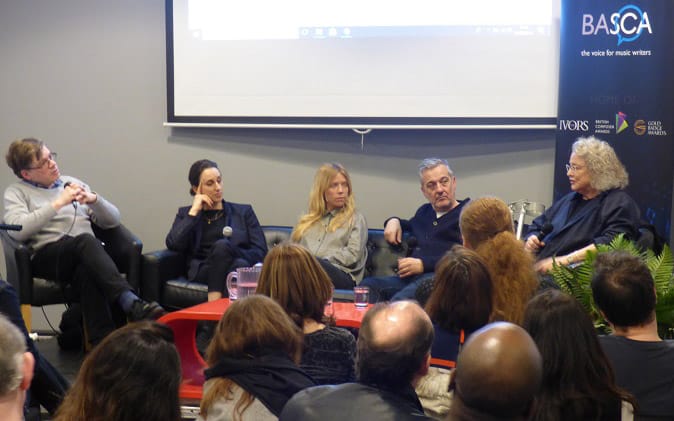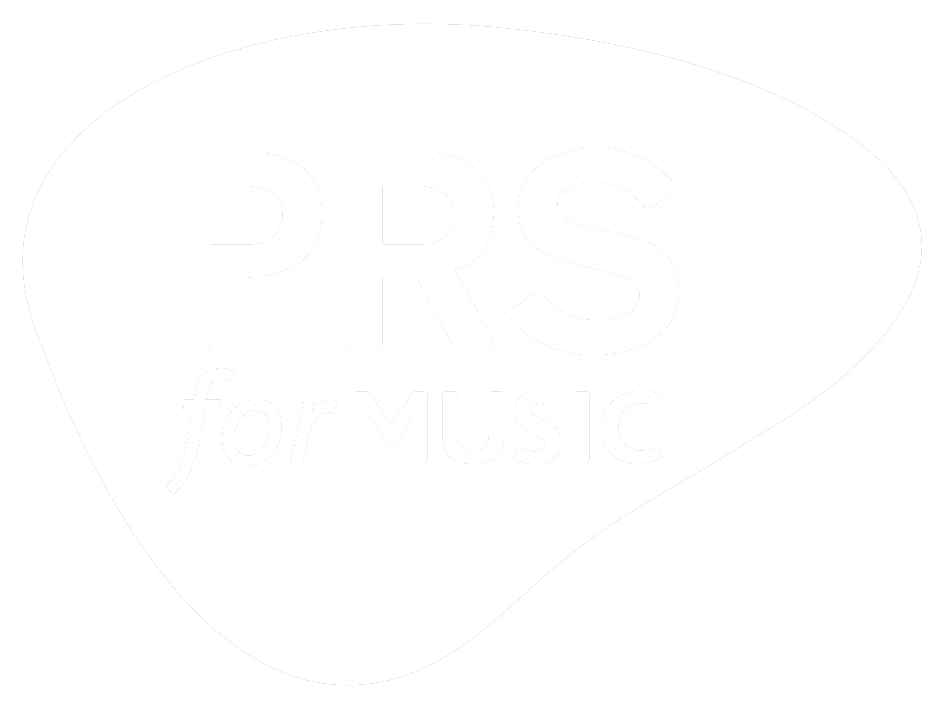BASCA Media Committee chair, Mark Ayres, moderated the panel with some of the biggest names across the advertising, film and TV sectors.
Nick Angel
Nick Angel was director of A&R for Island Records from 1990-99 where he signed PJ Harvey, Elbow and Pulp. In 1999, he became head of music for Working Title, supervising everything from Billy Elliot and Atonement to Bridget Jones’s Diary and Love Actually. Nick currently works independently and recently supervised Paddington 2 and Yardie.
Maggie Rodford
Maggie Rodford is Managing Director of the independently owned Air-Edel Group, working closely with composers, negotiating contracts, producing, music supervising and co-ordinating music recordings. She has worked on many high-profile films scores including Murder on the Orient Express, Kubo and the Two Strings and The King’s Speech.
Sarah Bridge
Sarah is an independent music supervisor for film & TV. Her credits include Oscar and multi award-winning The Theory of Everything, Ab Fab the Movie, Tolkien, Goodbye Christopher Robin and 8-Part TV drama Glue for which she was awarded both UK and International Music + Sound awards for Best Use of Existing Music in a TV Show.
Abi Leland
Abi is the founder and managing director of Leland Music and Leland Originals, working closely with the world’s most successful brands including Sony, Nike, Lloyds, Honda and filmmakers such as Kevin Macdonald on Touching The Void and The Last King of Scotland. She has supervised every John Lewis Christmas campaign since 2010.
What is a Music Supervisor?
MR Our responsibility is to deliver everything that the films needs for the music. So, this could be clearing the music, helping find the right composer, budgeting, advising on on-camera performers, supervising on the camera work, and really being the eyes and ears of the production for everything to do with music. And of course, this includes finding and seeking songs and placing songs within the film to the brief of the director and producer. We also obtain all the quotes, we look at all the contracts as they’re coming in – we have a duty of care, if you like, all the way through the process.
AL The role of the music supervisor is to work with the vision of the director and bring that vision to life.
SB Another role of the music supervisor is to protect the composer from endless amounts of notes of multiple different minds and personalities.
MR We’re not there to be dictatorial at any point, we’re there as somebody who can help. Whether it’s the conversation with the composer, finding the right piece of replacement source music because something’s too expensive, or coming up with a creative idea – our role is one to be helpful to all parts of the production
How do you discover music?
MR When we’re looking for completely original, new music, then the shout-out can be to all sorts of people – managers, agents, publishers, master owners – and it doesn’t have to be a big company, it can be small companies too
AL There are a lot of A&R elements to a music supervisor – we’re often discovering new music and new composers, it’s ingrained in us. We find music in so many different ways – obviously, relationships with publishers and labels and managers. And it’s being nerdy – what you discover watching other TV and films, and short films
NA There is only so much time in the day, so you do need gatekeepers of some description – editorially, playlist-wise or DJs, mates, or a record shop – whatever it is that you find as a similar mindset.
MR We listen to an enormous amount of original music in any one week – we’ll do a shout-out if there’s a particular style we’re looking for, and we share a lot of information within our working group. Some publishers are brilliant at highlighting where to look, and there are other publishers that have great catalogues but it’s more of a reactive relationship.
On production and library music
AL It’s a great source of additional income for composers. But now, it’s with the likes of the library houses that are going off the PRS rate card and are just doing their own thing and they’re driving the value way down. So, I’m still a big supporter of library music and think it’s a positive thing for composers to do in the right way and its very useful for certain productions, but I try to actively avoid the library companies that are doing things in a way that I don’t think is helpful.
MR Every project is so different – we’ve just worked on a project where a huge amount of the music is production music because the budget is such that we’ve had to find production music because it was impossible otherwise to deliver what was required.
AL You want to have your music with a library company that’s got good people within it – good creative people – because I’m not going to sift through a tonne of library music. I don’t care how good their filter system is, I want to talk to you and ask you directly for what I want.
SB There are some really good libraries with amazing catalogues. There are also a lot of younger independent libraries that specialise in particular genres. We’re usually aware of them if they email us, or through recommendations from other music supervisors.
AL Recently, we tend to use some of the smaller production music libraries more, because they’re more proactive and have teams of people who are really good at what they do.
NA But I think libraries are really useful for the likes of us when I need Chinese music, Japanese music, African music or big orchestral music where you can’t afford to pay
How do you budget for film and TV?
NA In an ideal world, we would have a conversation with the producers about how much money to allocate. Generally, I find that you’re brought in and told that this small amount of money is what’s allocated in the budget, which is never enough. I certainly think the halcyon days of ginormous sums of money for syncs are becoming less and less frequent.
AL There’s way more content out there that needs score, which is great, but not everyone is valuing composers and score as they should – as opposed to commercial music. We need to educate around that.
SB I recently worked on a film where they only had a limited amount for the recording of a score, and the composer was saying they couldn’t do it. We requested that he and his agent put together three different options, all with different costs and they went with the middle cost which was great. I think being able to physically see the different costs made it clearer.
MR You have to get a feel for where their budget is, and then it’s a question of trying to make it work.
How would a musician go about getting their music into the hands of a music supervisor?
MR I would encourage composers to absolutely make their music available to music editors – it is definitely a way for getting the opportunity to score a film. A music editor has got nothing to hide, so if a director turns around and asks who wrote a piece of temp music, then they’re going to say.
SB Short films are a great place to start, because that’s often where a composer wanting to move into film will begin.
AL I really like it, these days, when someone just picks up the phone and gives us a call, because people don’t do that anymore. We will actually favour responding to people who have approached us in a really good way or a personal way. We welcome composers sending us links to their reels.
NA You should approach with a smaller amount of tracks that you think are best and tell them you’ve got more if they’re interested. When someone says they’ve got some music for you and there’s about 15 or 20 tracks on one link, they haven’t edited themselves.
Do you have any other words of advice?
NA I think that, through basic equipment, we’re used to getting good quality demos – though I don’t think anyone expects a string line to sound like an orchestra. Some musicians are more technical than others and can deliver demos that sound like a finished score.
Try and do some form of basic research. It is incredible how I receive emails from people sending in a song for a particular film that we finished ages ago, or people who haven’t researched what the film is about, like sending us a dub track for a film set in 1583.
MR Keep really good records. I know it’s boring, but if a music supervisor comes to you and wants to clear your song and you already know exactly who they should talk to about the master, then you’re much more likely to get your song in that show. It can really help the process.
It’s a business these days, where there’s no excuse for a composer who isn’t ready for a recording session or doesn’t deliver to the schedule that’s been agreed. Unfortunately, that’s the sort of thing means it’s much harder for the composer to get hired on another project, because the business is a small business and word gets around.
NA You have to realise that if a production team doesn’t like a piece you’ve written for a brief, it’s not personal – you have to just say ‘okay’ and see what else you can write. I think when you’re creating music for yourselves, you’re your own judge, and if you don’t want to listen to your A&R or your manager, then you don’t have to – this is not quite the case with music supervisors.
Article first featured in The Works [2018]





